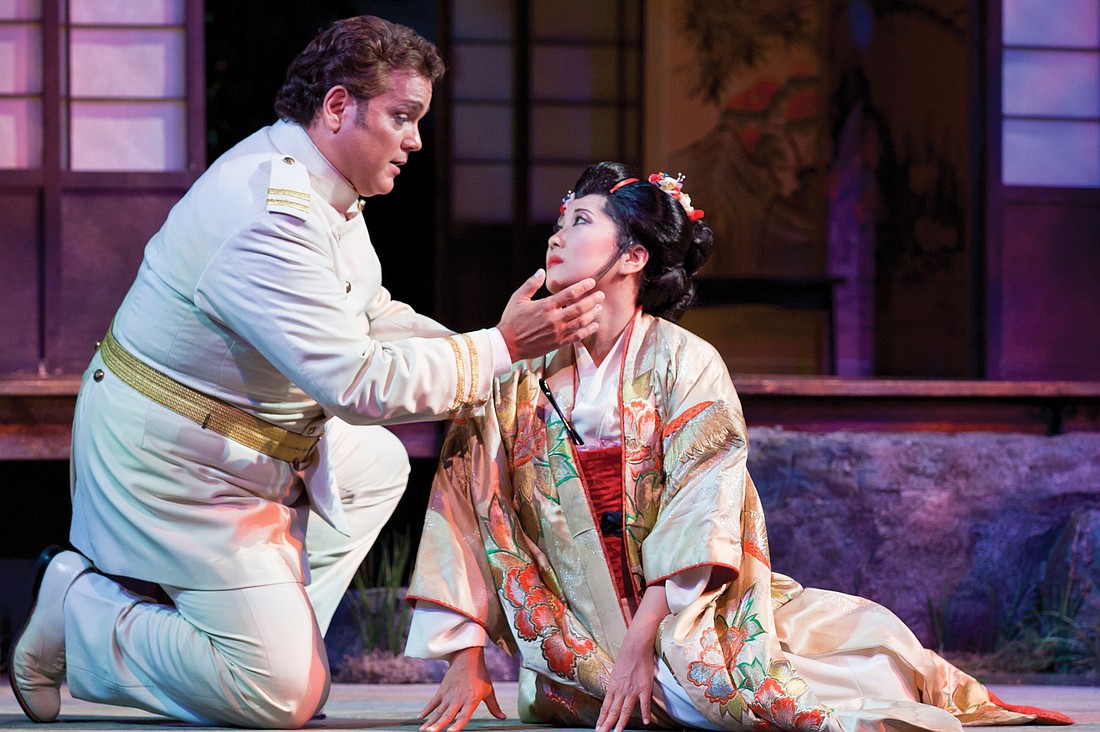- November 28, 2024
-
-
Loading

Loading

I have wept through many a moving “Madama Butterfly,” from the Met and New York City Opera to companies abroad and cinematic versions that broke my heart, but the fall production mounted by Sarasota Opera is the most convincing, honest, moving and beautiful I’ve seen yet. Giving us just the right mix of truth to the score and truth to the story, this “Butterfly” does Puccini, a true man of the theater, proud.
We saw this production here only four years ago, but this was like a brand-new, sparkling version. The set by David P. Gordon is the same, but in the new lighting design by Ken Yunker, the Japanese house, gardens and view of the bay have come alive. Yunker has recreated dusks, dawns, shadows, stars and sunlight so beautiful that Homer’s “Rosy Fingered Dawn,” written some 3,000 years ago, seems to have been the inspiration. Yet the exquisiteness of this production doesn’t detract from the other important things happening on this stage.
In fact, what makes this “Butterfly” special is that every element goes toward furthering the drama, from the beautifully crafted sound Artistic Director and conductor Victor DeRenzi elicits from the Sarasota Orchestra, to the elegant staging Martha Collins has given the performers.
Of course, everyone involved in this production has to give credit to Giacomo Puccini’s music drama, which he based on a story by John Luther Long, a play by David Belasco and a libretto by Giuseppe Giacosa and Luigi Illica. Puccini’s first version was quite different from the one we’ve come to know. It was originally even harsher in its drawing of Lt. B.F. Pinkerton and his ugly American attitude toward Japanese culture. The original didn’t go over well with audiences, and Puccini tempered the lieutenant’s arrogance, making him somewhat sympathetic to early 20th-century audiences.
Rafael Dávila’s Pinkerton is brash without being insolent. His ringing but hard-edged tenor shows us that this is a man who simply doesn’t consider another person’s feelings, especially if they belong to a woman of a different culture that he’s loathe to understand. Even when Sharpless, the United States consul, warns him that Butterfly will take their “marriage” seriously, he brushes it off, saying he’s leasing a Japanese wife, just like he’s buying a Japanese house, for 999 years — with an option to cancel every month. Marco Nistico’s Sharpless is sympathetic and gorgeously sung, portraying a man who may have been born in the USA but has come to understand and admire the Japanese culture.
There’s little one can do to make Goro, the pimp-like marriage broker, or Butterfly’s uncle, Bonze, more than the superficial stick figures they represent, but Jamin Flabiano (Goro) and Jeffrey Beruan (Bonze) did admirably.
Suzuki, as portrayed by Nina Yoshida Nelsen, was a warm, empathetic, nanny-type servant whose very posture on stage gave her character a history. Nelsen, in real life, is a young woman, but her makeup, designed by Georgianna Eberhard, turned her into an elderly servant with a deep love for her charge, whom she probably served since Butterfly’s birth. In this account, she has the wisdom to know this “marriage” to the American is doomed, but, like a loving mother, she serves her well.
Cio-Cio-San, also known as Madama Butterfly, is only 15 when we meet her. Her death, by her own hand some three years later, is all the more poignant, because it could have been avoided had Pinkerton been different. But that’s what makes this a true tragedy, drawing tears from audiences who have seen it dozens of times.
Great singing and acting are also necessary in this work, and Asako Tamura, as Butterfly, grew into the role with her large, focused soprano portraying her character as beautifully as her superb acting. Tamura’s top loses focus occasionally, but the rest of her voice shimmers with tension, emotion and a Puccini sound reminiscent of a young Scotto. Her “Un bel di” was both sympathetic and beautiful, woven into the texture of the scene rather than standing alone. And her simple gesture, motioning toward her son (the blond and beautiful child known as Sorrow, played by Christian Pangallo) while she drew her last breath so Pinkerton would know she was giving him her most precious gift, was one of the most touching and heartbreaking bits of stagecraft to come to this opera.
In the details: Tamura and Nelson give a gorgeously blended sound to the Flower Duet, and Kate Pinkerton, the real (American) wife of the lieutenant, as played and sung by Apprentice Artist Lindsay Barche is, for once, a sympathetic person. Adding to the dramatic appeal of this production are the finely written surtitles by Stephanie Sundine that add insight and understanding. There are still performances left, and this is a “Butterfly” to catch.